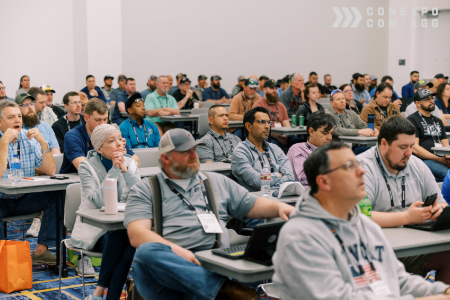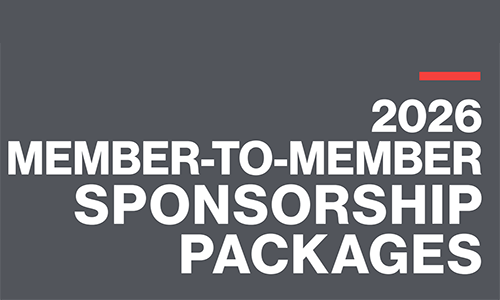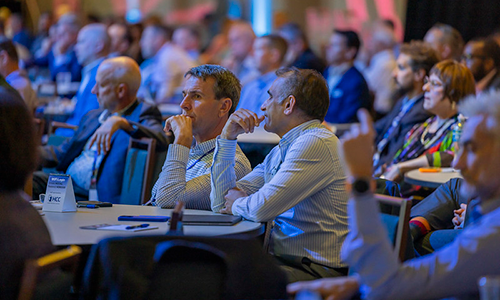By Mike Schmidt, AEM Director of Industry Communications —
It was early 2021, and the job offers weren’t materializing for Thomas Breitschwerdt.
Despite a stellar resume and a well-rounded skillset suited for a role in engineering, Thomas found himself unable to find the right opportunity with the right company. To make matters worse, he could never seem to advance past the interview phase of the hiring process. His difficulty with social skills caused him to struggle anytime the situation called for engaging in conversation with potential employers. Nothing seemed like a proper fit, no matter what steps Thomas took to secure full-time employment.
“I witnessed firsthand how a perfectly capable person with value to be added to society was struggling to find employment and be able to provide that value,” said Otto Breitschwerdt, Thomas’s father and a Director on AEM's CE Sector Board.
“It’s so difficult to find the right talent for the right jobs today. Because it’s such a challenge is one of the main reasons why we offer Workforce Solutions at AEM. I feel like neurodivergent individuals represent an untapped talent pool, but it’s not one that’s approached in a conventional way. It needs to be a win-win situation.” -- AEM CE Sector Board Director Otto Breitschwerdt
Taking Steps to Secure Employment
Eventually, Otto intervened on his son’s behalf. He looked into organizations with expertise and experience in making organizational hiring processes more suitable for neurodiverse jobseekers. Through his brother-in-law, Otto came across a Danish social innovator organization called Specialisterne. The company worked to prepare neurodiverse people for job opportunities in certain industries and trained employers to be more inclusive, supportive, and capable of putting them to work.
The team at Specialisterne seemed like it could help Thomas. He participated in workshops put on by the organization to support his efforts to find full-time employment in the field of engineering. Thomas also worked with Specialisterne to build a portfolio for employers to evaluate his potential as a job candidate – how he thought, communicated, and operated most effectively in the workplace.
“The way Specialisterne made workshop sessions allowed me to feel somewhat more at home,” said Thomas. “It was clear actually performing work and exhibiting my own work ethic mattered more than being social in an interview. I was just able to be myself.”
Eventually, Thomas and two other Specialisterne candidates were selected as finalists for an open position at a large aerospace company and manufacturer. A three-month-long hiring process led to Thomas securing a position as a software engineer for the company. Five months later, he transitioned from working as an independent contractor under Specialisterne to a role as a full-time employee.
A Win-Win Situation
Now, just a few months shy of his third work anniversary at the company, Thomas is thriving in his role.
He credits his success to the fact that employers today are becoming increasingly more understanding of the challenges neurodiverse jobseekers face sometimes as they compete for jobs that align with their skills. More and more companies are fostering partnerships with organizations such as Specialisterne to enhance talent acquisition efforts and make the hiring process more inclusive for candidates like Thomas. Ultimately, by leveraging these relationships, employers are not only attracting and hiring neurodivergent individuals with unique skillsets. They are also enhancing the diversity of their workforce, as well as optimizing their business operations in order to achieve organizational goals.
“It’s so difficult to find the right talent for the right jobs today,” said Otto. “Because it’s such a challenge is one of the main reasons why we offer Workforce Solutions at AEM. I feel like neurodivergent individuals represent an untapped talent pool, but it’s not one that’s approached in a conventional way.”
Organizations can be willing to hire neurodiverse employees and well-intended when it comes to onboarding them, but it’s often not enough to ensure success, according to Otto. Ultimately, he said, success hinges on finding the right positions for neurodiverse talent, training organizational leaders, and following through on effective post-hire strategies and tactics.
“It needs to be a win-win situation,” said Otto. “That requires a bit of preparation on the part of the employer. But if it’s done right, you end up with high-performing and loyal people who work for you for a long time.”
Want more information on best practices, tools, programs, and resources to help attract and retain the right talent? Visit AEM’s Workforce Solutions Toolkit.
“In a labor market where there is a lack of talent, you can’t afford to overlook any available pool. There are so many neurodiverse who want a chance to work and develop in their professional career, and they haven’t received too many opportunities. So, to employers, I say, ‘Don’t overlook this opportunity.’” -- Specialisterne General Manager Francesc Sistach
Attracting the Right Talent for the Right Job
According to Specialisterne General Manager Francesc Sistach, his organization not only works to help neurodivergent people develop skills and prepare themselves for lasting success in the workforce. It also collaborates with employers to help foster greater levels of inclusivity within their organizations and a better understanding of neurodiversity.
“We want organizations to be more capable of providing some accommodations and moving toward being much more of an inclusive organization,” said Sistach. “Because it’s not just about providing a job, it’s about providing a professional career.”
Unfortunately for employers, finding the right person for the right role is no small task right now. As of late 2023, 8.87 million jobs were available in the United States, along with just 4.41 million unemployed people. With two unfilled positions for every potential candidate, organizations need to do everything they can to attract, train, and eventually retain the workforce of tomorrow.
“We all need to find talent and fill jobs,” said Otto. “Specialisterne, or an organization like it, can function as a matchmaker to help. They found an open position where Thomas could add value, and they found a great candidate in him who could do the job.”
Making hiring processes more suitable for neurodiverse candidates takes a ton of work. There’s also a cost associated with doing it correctly. But in the end, organizations can end up generating social impact, fostering a more inclusive workplace, and – more than anything else – employing a talented, productive, and loyal employee like Thomas Breitschwerdt.
“In a labor market where there is a lack of talent, you can’t afford to overlook any available pool. There are so many neurodiverse who want a chance to work and develop in their professional career, and they haven’t received too many opportunities,” said Sistach.
“So, to employers, I say, ‘Don’t overlook this opportunity,’” he added.
For more information on Thomas’s story or Specialisterne’s efforts to make organizational hiring processes more suitable for neurodiverse jobseekers, contact Francesc Sistach at fransec.sitstach@specialisterne.com.
For more AEM member perspectives, subscribe to the AEM Industry Advisor.





